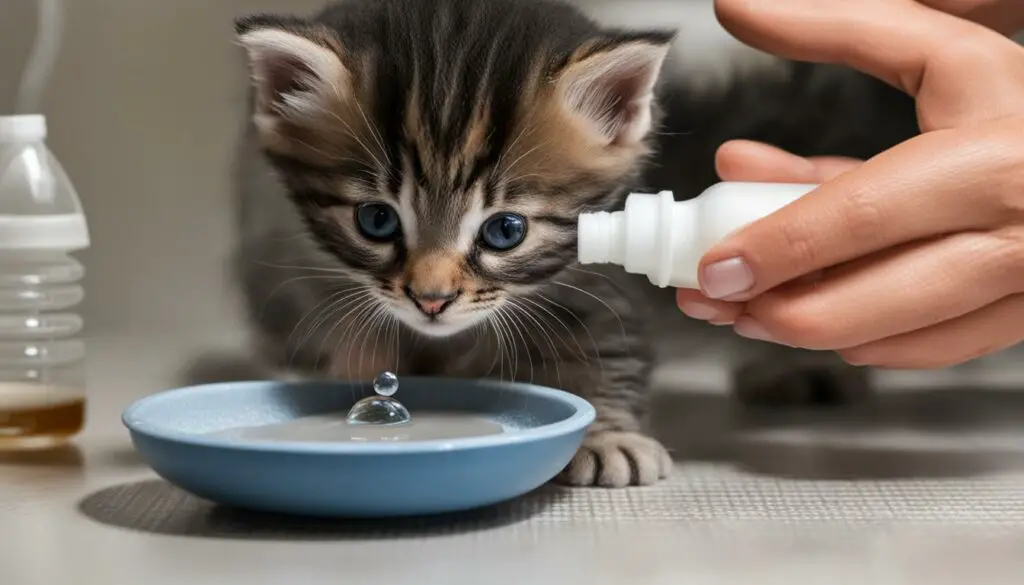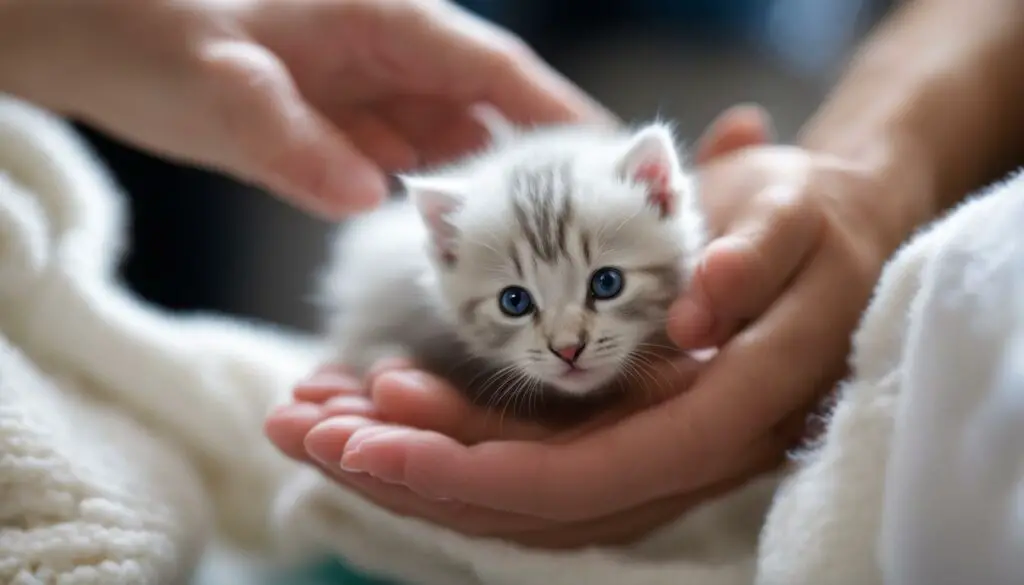Welcome to my guide on how to properly feed newborn kittens! If you’ve found yourself caring for these adorable little creatures, it’s crucial to provide them with the right nutrition to ensure their growth and well-being. In this article, I’ll walk you through what to feed newborn kittens, feeding schedules, homemade kitten formula, and more. Let’s dive in!
When it comes to feeding newborn kittens, their nutritional needs are different from adult cats. At this age, kittens rely on their mother’s milk for essential nutrients. However, if the mother is absent or unable to nurse, it’s important to provide a suitable substitute called kitten milk replacer. Avoid using cow’s milk as it can make cats sick.
Feeding newborn kittens should be done every 3 hours to prevent dehydration. It’s crucial to maintain cleanliness during the feeding process, making sure to wash your hands and bottles before and after each feeding. Additionally, burping the kittens after each feeding helps prevent discomfort.
As the kittens reach 3.5 to 4 weeks old, the weaning process can begin. This involves gradually introducing solid food while reducing their reliance on the bottle. It’s important to monitor their weight, growth, and stool throughout the feeding and weaning process.
Key Takeaways:
- Newborn kittens under 4 weeks old should be fed a kitten milk replacer if the mother is absent or unable to nurse.
- Feeding should be done every 3 hours to prevent dehydration, and cleanliness is vital in the feeding process.
- The weaning process can begin at around 3.5 to 4 weeks old, gradually introducing solid food while reducing reliance on the bottle.
- Monitor the kittens’ weight, growth, stool, and seek veterinary advice if needed.
- Caring for newborn kittens requires attention to their nutrition, feeding schedules, and overall well-being.
How to Feed Newborn Kittens
Feeding newborn kittens requires special care and attention to ensure they receive the necessary nutrition for their growth and development. Here are some important steps to follow when feeding newborn kittens:
- Choose the right kitten formula: Newborn kittens should be fed a specially formulated kitten milk replacer, as cow’s milk is not suitable for their nutritional needs. Look for a high-quality kitten formula such as Kitten Milk Replacement (KMR) that provides the necessary nutrients.
- Warm the formula: Before feeding, warm the formula to the appropriate temperature. Test it on the inside of your wrist to make sure it’s not too hot. The ideal temperature is around 100-105°F (37-40°C), which is similar to the mother cat’s body temperature.
- Use a kitten bottle: Feed the kittens using a small kitten bottle with elongated nipples that mimic the shape of a mother cat’s nipple. This will make it easier for them to latch on and nurse.
- Position the kittens correctly: Hold the kittens in a position similar to how they would nurse from their mother. Place them on their stomachs and support their bodies with one hand while holding the bottle with the other.
- Feed in small, frequent meals: Newborn kittens have small stomachs and need to be fed small amounts frequently. The feeding schedule depends on their age, starting with every 2 hours for kittens under 1 week old and gradually increasing the time between feedings as they grow.
- Burp the kittens: Just like human babies, kittens need to be burped after feeding to release any trapped air in their stomachs. Gently pat their backs until they burp.
Remember to always wash your hands before handling the kittens and sterilize the feeding equipment to maintain cleanliness and prevent the spread of bacteria. If you have any concerns about the kittens’ feeding or need advice, consult a veterinarian who can provide expert guidance tailored to the specific needs of your kittens.
Table: Feeding Schedule for Newborn Kittens
| Age | Number of Feedings per Day | Amount per Feeding |
|---|---|---|
| 0-1 week | 8-12 | 5-7 ml |
| 1-2 weeks | 6-8 | 10-14 ml |
| 2-3 weeks | 5-6 | 15-20 ml |
| 3-4 weeks | 4-5 | 20-30 ml |
By following these guidelines, you can ensure that your newborn kittens receive the proper nourishment they need to thrive and grow into healthy adult cats.

Weaning Newborn Kittens
Weaning is an important milestone in the development of newborn kittens, as they transition from a liquid diet to solid food. This process typically begins around 4 weeks of age, when the kittens start showing an interest in their mother’s food. Introducing solid food gradually ensures a smooth transition and allows their digestive systems to adjust.
Weaning Process
The weaning process can start by offering the kittens a small amount of kitten formula or wet canned food on a spoon. This helps them get accustomed to new textures and tastes. Over time, the amount of formula can be gradually reduced while increasing the portion of solid food. It’s important to monitor the kittens’ response to the food and their stool consistency, as any signs of digestive upset should be addressed promptly.
Additionally, water should be provided to the kittens to ensure hydration during the weaning process. Offering a shallow dish of water can encourage them to start drinking independently. It’s important to change the water frequently to keep it clean and fresh for the kittens.
Introducing Dry Food
As the kittens progress in their weaning journey, dry food can be introduced. Start by moistening the dry kibble with water or kitten formula to make it easier for them to chew and digest. Gradually reduce the amount of moisture added until they are comfortable eating dry food on its own. Each kitten may have different preferences and timelines for transitioning to solely dry food, so it’s essential to monitor their individual progress.
| Age | Feeding Method | Frequency |
|---|---|---|
| 4 Weeks | Kitten formula or wet food on a spoon | 2-3 times a day |
| 5-6 Weeks | Kitten formula or wet food mixed with small amounts of dry food | 3-4 times a day |
| 7-8 Weeks | Moistened dry food | 3-4 times a day |
Remember to always provide fresh water and monitor the kittens’ overall health and growth during the weaning process. Seeking veterinary advice for any concerns or questions is highly recommended to ensure the kittens receive proper care and nutrition.

Ensuring Proper Weight and Hydration
Monitoring the weight and hydration of newborn kittens is vital for their overall health and well-being. As their primary caregiver, it is essential to keep a close eye on their weight gain and ensure they are adequately hydrated.
Weight Monitoring: Kittens should typically gain at least 10 grams per day to indicate healthy growth. To accurately measure their weight, use a gram scale designed for small animals. Weigh the kittens daily and record their progress in a journal or spreadsheet to identify any concerning trends or sudden weight loss.
Hydration: Proper hydration is crucial for kittens’ health, especially during their early development stage. Once the kittens start the weaning process, provide them with a shallow bowl of fresh water. Monitor their water intake to ensure they stay hydrated throughout the day.
| Signs of Proper Hydration | Signs of Dehydration |
|---|---|
|
|
In case you notice any signs of dehydration or if the kittens are not gaining weight as expected, it is crucial to seek veterinary advice promptly. A veterinarian can provide guidance and suggest appropriate solutions to address these issues and ensure the kittens’ health and well-being.

Proper Weight and Hydration Tips:
1. Regularly weigh the kittens using a gram scale designed for small animals and record their weight daily.
2. Ensure a shallow bowl of fresh water is available for the kittens once they start the weaning process.
3. Look for signs of proper hydration, such as moist gums, elastic skin, engaged behavior, and clear urine.
4. Watch out for signs of dehydration, such as dry and tacky gums, poor skin elasticity, lethargy, and darker urine.
5. Seek veterinary advice if you notice any concerns related to weight gain or hydration.
Creating a Warm and Safe Environment
Newborn kittens are not able to regulate their body temperature until they are at least 3 weeks old. Therefore, it is crucial to provide them with a warm and safe environment to thrive. Ensuring the right temperature and a secure space is essential for their well-being and development. Here are some tips on creating a warm and safe environment for newborn kittens:
Providing Adequate Warmth
One of the most important aspects of caring for newborn kittens is to provide them with the right amount of warmth. A heating pad designed for pets can be used to create a warm nest for the kittens. Place the heating pad in the nesting area and cover it with towels or a soft fleece blanket. This will mimic the warmth they would have received from their mother. Regularly check the temperature and ensure it is not too hot or too cold for the kittens.
Choosing a Safe Location
The location of the nesting area is equally important. Choose a warm, draft-free room for the kittens. This room should be away from other pets or sources of potential stress. Creating a quiet and peaceful environment will help the kittens feel safe and secure. Keep in mind that kittens are vulnerable, especially when they are very young, so it’s crucial to minimize potential dangers and disturbances.
Maintaining Cleanliness
Keeping the nesting area clean is essential for the health and hygiene of the kittens. Clean the area daily, removing any soiled bedding or waste. Use a mild, pet-safe disinfectant to clean the area and ensure that it is free from bacteria or harmful substances. Regularly washing your hands before handling the kittens and their bedding will further maintain a clean environment and reduce the risk of infection or illness.
By providing warmth, choosing a safe location, and maintaining cleanliness, you can create a warm and safe environment for newborn kittens. Remember to monitor their well-being closely and seek veterinary advice if you have any concerns. With your care and attention, these vulnerable little creatures will have the best start in life.

Handling and Care of Newborn Kittens
When it comes to handling and caring for newborn kittens, it’s important to approach them with gentleness and caution. These fragile creatures require special attention and care, especially during the early weeks of their lives. Here are some essential tips to ensure their well-being:
1. Limit direct physical contact:
Newborn kittens’ immune systems are still developing, so it’s crucial to minimize direct physical contact, especially when their eyes are still closed. This helps reduce the risk of transmitting any germs or infections. Instead, observe them from a distance and check on their health and weight regularly. If you need to handle them, make sure to wash your hands thoroughly and handle them with extreme care.
2. Respect the mother cat’s comfort:
The mother cat plays a vital role in caring for her kittens, and her comfort and well-being should be respected. If she appears anxious or stressed when approached, it’s best to give her and the kittens space. Creating a calm and stress-free environment is essential for their overall health and development.
3. Stimulate elimination:
Newborn kittens rely on their mother to stimulate their elimination until they are around 3 to 4 weeks old. In the absence of their mother, gentle stimulation is necessary to help them urinate and defecate. Use a clean, warm, wet cotton ball or cloth and gently massage their genital area after each feeding. This replicates the mother’s licking and helps initiate the elimination process.
Remember, each kitten is unique, and their care may vary. It’s crucial to closely monitor their health, weight, and behavior. If you have any concerns or questions, don’t hesitate to seek veterinary advice to ensure the best care for these precious little ones.

Table: Kitten Care Checklist
| Aspect of Care | Recommended Actions |
|---|---|
| Nutrition | Feed kitten milk replacer every 3 hours until weaning. |
| Environment | Create a warm and safe nesting area away from drafts. |
| Weaning | Gradually introduce solid food starting around 4 weeks of age. |
| Hygiene | Regularly clean the nesting area and provide fresh water. |
| Health Monitoring | Monitor weight, hydration, and overall growth regularly. |
| Veterinary Advice | Consult a veterinarian for guidance and professional care. |
By following these kitten care tips and providing them with the love and attention they need, you’ll be helping these little bundles of joy thrive and grow into healthy and happy cats.
Seeking Veterinary Advice
When it comes to the health and well-being of newborn kittens, it is always advisable to consult a veterinarian for guidance and support. Veterinary professionals have the knowledge and expertise to provide the best care for these fragile creatures. Whether you have concerns about nutrition, feeding schedules, weight monitoring, or overall health, a veterinarian can offer valuable insights and recommendations.
Consulting a veterinarian is particularly important if you notice any signs of illness or if the kittens are not gaining weight as expected. A veterinarian can conduct a thorough examination, provide necessary vaccinations, and address any health issues that may arise. They can also guide you through the weaning process and offer advice on introducing solid food to the kittens.
Additionally, a veterinarian can provide preventive care, such as flea and parasite control, to ensure the kittens remain healthy and protected. Regular check-ups and vaccinations are essential to their long-term well-being. By seeking veterinary advice, you are taking proactive steps to ensure the newborn kittens receive the best possible care and support.

Why Veterinary Guidance Matters
There are several reasons why veterinary guidance is crucial for newborn kitten care:
- Veterinarians have in-depth knowledge of feline health and can provide accurate information on nutrition, feeding, and growth.
- They can assess the overall health of the kittens and detect any underlying medical conditions that may require treatment.
- Veterinarians can recommend appropriate vaccinations and preventive care measures to protect the kittens from common diseases.
- They can offer guidance on socialization and behavior training, ensuring the kittens develop into well-adjusted and happy cats.
- By seeking veterinary advice, you are accessing a wealth of professional experience and ensuring the best possible care for the newborn kittens.
Building a Relationship with Your Veterinarian
Establishing a relationship with a veterinarian early on is important for ongoing kitten care. Regular check-ups and open communication will help ensure that any issues are addressed promptly. It is recommended to schedule regular visits to monitor the kittens’ growth and development, as well as to receive guidance on their changing needs.
If you are unsure about choosing a veterinarian, ask friends, family, or fellow pet owners for recommendations. Look for a veterinary clinic that specializes in feline care or has experience with newborn kittens. By building a relationship with a trusted veterinarian, you can provide the best care for your newborn kittens and set them up for a healthy and happy life.
Finding Support Along the Way
Caring for newborn kittens can be a rewarding yet challenging experience. Remember that you don’t have to navigate this journey alone. Reach out to local animal shelters, rescue organizations, or online communities for support and guidance. These resources can provide additional tips, tricks, and insights to help you provide the best care for the kittens.
By seeking veterinary advice and utilizing available support networks, you can ensure that the newborn kittens receive the comprehensive care they need. Remember, the well-being of these tiny creatures relies on your dedication and commitment to their health and happiness.
Neonatal Kitten Care Tips
When it comes to caring for neonatal kittens, attention to detail is essential. These tiny creatures require specialized care to ensure their well-being and healthy development. Here are some tips to help you navigate the challenges of caring for newborn kittens:
1. Providing Warmth and Comfort
Newborn kittens are unable to regulate their body temperature, so it’s crucial to create a warm and safe environment for them. Use a heating pad designed for pets, covered with towels or a soft fleece blanket, to provide a cozy nest. Place the nest in a warm, draft-free room away from other pets. Regularly check the kittens to ensure they are warm and comfortable, adjusting the temperature as needed.
2. Feeding and Hydration
Proper nutrition is vital for the growth and development of newborn kittens. Use a suitable kitten milk replacer and follow a feeding schedule recommended by a veterinarian. It’s important to burp the kittens after each feeding to prevent discomfort. Additionally, monitor their weight and hydration levels closely. If you have any concerns about their feeding habits or hydration, consult a veterinarian for guidance.
3. Regular Monitoring and Care
Regular monitoring of the kittens’ weight, growth, and overall health is crucial for early detection of any issues or concerns. Keep track of their weight daily and record any changes. It’s also important to provide gentle stimulation for elimination until the kittens are old enough to use a litter box. Gradual litter training can begin at around 4 weeks of age using a shallow litter pan and non-clumping litter.
Caring for neonatal kittens can be challenging, but with the right knowledge and resources, it can also be a rewarding experience. Always seek veterinary advice and assistance to ensure the best possible care for these delicate little ones.

Conclusion
Caring for newborn kittens requires knowledge and attention to detail. As a pet owner, it’s important to provide the proper nutrition, warmth, and care that these little ones need. Knowing what to feed newborn kittens and following a kitten feeding guide is essential. Providing a suitable milk replacer and gradually introducing solid food during the weaning process will ensure their growth and development.
Remember to monitor their weight, hydration, and overall growth regularly. This will help you detect any issues or concerns early on. If you ever have questions or concerns about their care, don’t hesitate to seek veterinary advice. Veterinarians can provide valuable guidance and support throughout the process.
Caring for newborn kittens is a commendable task. With the right knowledge and resources, it can be a rewarding experience. Follow the kitten care tips and guidelines provided, and you’ll be well on your way to giving these precious little ones the best start in life.
FAQ
What should I feed newborn kittens?
Newborn kittens should be fed a kitten milk replacer, such as Kitten Milk Replacement (KMR), as cow’s milk is not suitable for their nutritional needs.
How often should I feed newborn kittens?
Kittens should be fed every 3 hours to avoid dehydration.
When should I start weaning newborn kittens?
The weaning process can begin around 4 weeks of age by gradually introducing solid food.
How do I monitor the weight and growth of newborn kittens?
Kittens should gain at least 10 grams per day, and their weight should be recorded daily.
How do I create a warm and safe environment for newborn kittens?
Use a heating pad covered with towels or a soft fleece blanket to create a warm nest, and place it in a warm, draft-free room away from other pets.
How should I handle and care for newborn kittens?
Limit direct physical contact, check their health and weight regularly, and gently stimulate elimination until they can use a litter box.
When should I seek veterinary advice for newborn kittens?
It is advisable to consult a veterinarian for guidance on nutrition, feeding schedules, and overall health.
What are some neonatal kitten care tips?
Reach out to veterinarians and shelters for assistance, provide warmth and appropriate bedding, follow a feeding schedule, monitor weight and hydration, and consult a veterinarian.








